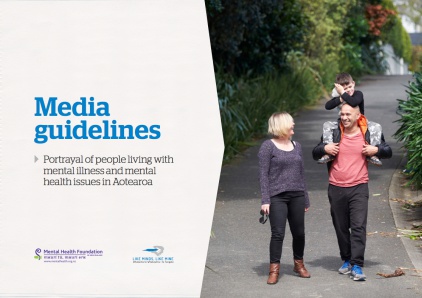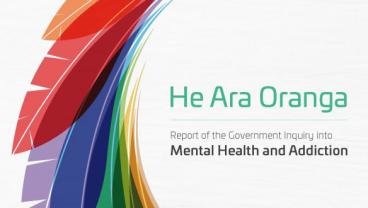Media guidelines
Media guidelines: Portrayal of people living with mental illness and mental health issues in Aotearoa
These guidelines will equip journalists with the confidence and understanding to report on mental illness and mental health issues safely, accurately and respectfully. One in five Kiwis will experience a mental health problem this year, and more than half of us will go through distress or mental illness at some point in our lives. See quick reporting checklist here.
 Journalists hold great power and can influence public opinion about people with mental
illness in positive and negative ways. People’s attitudes can reinforce stigma and lead to
discrimination, which is a barrier to recovery and being able to live a full life.
Journalists hold great power and can influence public opinion about people with mental
illness in positive and negative ways. People’s attitudes can reinforce stigma and lead to
discrimination, which is a barrier to recovery and being able to live a full life.
When handled well, reporting can:
- change public misconceptions
- challenge myths and educate people about mental health
- change attitudes that reinforce mental illness stigma and lead to discrimination
- encourage people in distress to seek help
- support hope and recovery.
When handled poorly, reporting can:
- make it less likely that people experiencing mental distress will ask for help
- mislead the public about what experiences of mental illness and mental health care are like
- reinforce misguided beliefs that people living with a mental illness are dangerous and to be feared
- increase feelings of shame and isolation for people experiencing distress.
The guidelines were created in collaboration with media and mental health consumer representatives, and informed by evidence-based practice.
Download and print the guidelines and checklist.
Please include helplines in your stories.
|
|
|
| Need to talk? | Free call or text 1737 any time for support from a trained counsellor. |
| Lifeline | 0800 543 354 (0800 LIFELINE). |
| Youthline | 0800 376 633, free text 234 or email talk@youthline.co.nz or online chat. |
| Samaritans | 0800 726 666. |
|
|
|
More information
For media queries contact:
Danielle Whitburn
Senior Communications and Marketing
Officer
09 623 4810
022 120 3421
danielle.whitburn@mentalhealth.org.nz
Good reads

Award for rural mental health resources
Yvonne
Yvonne O'Hara was late coming to journalism, but fast catching up. “I... Read more

Editorial
Why the media matters
Research indicates that uninformed media coverage of mental distress can contribute to... Read more

The Mental Health Inquiry
He Ara Oranga
The Report of the Government Inquiry into Mental Health and Addiction, released... Read more

Challenge the stigma behind Raurimu
Michael
How do you tell a story of extreme mental distress? And if... Read more

perpetrators or patients
Mike
When Mike Wesley-Smith left his career in law five years ago for... Read more

Portraying mental illness on the small screen
Shortland Street
Fictional characters with experience of mental illness are often one-dimensional, frequently disappointing... Read more


